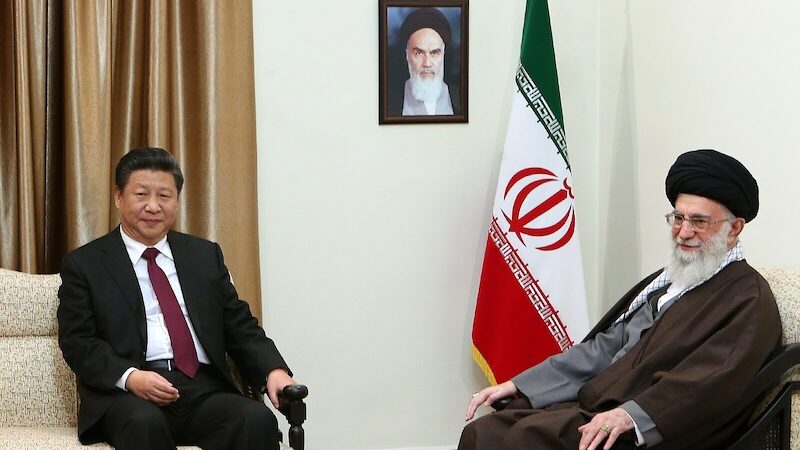America's Middle East Policy: Is China The Ultimate Beneficiary?

Welcome to your ultimate source for breaking news, trending updates, and in-depth stories from around the world. Whether it's politics, technology, entertainment, sports, or lifestyle, we bring you real-time updates that keep you informed and ahead of the curve.
Our team works tirelessly to ensure you never miss a moment. From the latest developments in global events to the most talked-about topics on social media, our news platform is designed to deliver accurate and timely information, all in one place.
Stay in the know and join thousands of readers who trust us for reliable, up-to-date content. Explore our expertly curated articles and dive deeper into the stories that matter to you. Visit Best Website now and be part of the conversation. Don't miss out on the headlines that shape our world!
Table of Contents
America's Middle East Policy: Is China the Ultimate Beneficiary?
The shifting sands of the Middle East are witnessing a dramatic power play, with the United States' role undergoing a significant reassessment. As America pivots its focus towards great power competition with China and Russia, and confronts domestic challenges, some analysts are questioning whether China is quietly emerging as the ultimate beneficiary of a waning American influence in the region. This isn't to say the US is abandoning the Middle East entirely, but the changing priorities raise crucial questions about regional stability and the future geopolitical landscape.
A Declining US Footprint?
For decades, the US maintained a strong military and diplomatic presence in the Middle East, driven by strategic interests in oil, combating terrorism, and containing regional rivals. However, the costly wars in Iraq and Afghanistan, coupled with a growing weariness of protracted foreign entanglements within the American public, have fueled a desire for a less interventionist foreign policy. This shift is evident in the Biden administration's efforts to recalibrate US relations with the region, focusing on a less confrontational approach and prioritizing diplomacy over military action. This recalibration, however, creates an opportunity for other global powers to step into the vacuum.
China's Growing Influence
China, with its burgeoning Belt and Road Initiative (BRI), is aggressively expanding its economic and political influence across the Middle East. This massive infrastructure project aims to connect Asia, Africa, and Europe through a network of roads, railways, and ports, significantly boosting trade and economic integration. Several Middle Eastern countries have embraced the BRI, receiving substantial investments in infrastructure projects in exchange for access to resources and strategic partnerships. These investments aren't purely economic; they foster political goodwill and a dependence on China, subtly shifting regional allegiances.
Beyond Economics: Security and Geopolitics
China's ambitions extend beyond economic dominance. It's actively engaging in security partnerships, including arms sales and military training exercises, strengthening its strategic relationships with key players in the region. This contrasts with the more conditional nature of US military support, often tied to specific security concerns and democratic reforms. China’s approach, while criticized for lacking transparency and potentially undermining regional stability in some instances, offers a different kind of engagement – one focused primarily on mutual economic benefit and non-interference in internal affairs.
Key Areas of Chinese Influence:
- Energy Security: China is the largest importer of oil, and its relationships with major Middle Eastern oil producers are crucial for its energy security.
- Infrastructure Development: The BRI is transforming the Middle East's infrastructure landscape, creating dependence and solidifying China's presence.
- Technological Partnerships: China is offering advanced technological solutions in areas like 5G and AI, further strengthening its ties with regional governments.
Is it a Zero-Sum Game?
It's crucial to avoid framing this as a simple zero-sum game. The US continues to play a significant role in the Middle East, maintaining vital security partnerships and influencing regional dynamics. However, China's rise is undeniable, and its growing influence presents a complex challenge to US interests.
The Future of the Middle East
The future of the Middle East will likely involve a multipolar balance of power, with both the US and China playing significant, though evolving, roles. The key lies in how effectively the US adapts to this changing landscape, balancing its need to manage great power competition with its long-standing strategic interests in the region. The question of whether China is the ultimate beneficiary remains open to debate, but its growing influence is undeniable and warrants serious consideration for policymakers and analysts alike.
Further Reading:
- [Link to a relevant article on US Middle East policy from a reputable source]
- [Link to a relevant article on China's Belt and Road Initiative]
Call to Action: What are your thoughts on the evolving dynamics between the US and China in the Middle East? Share your perspective in the comments below.

Thank you for visiting our website, your trusted source for the latest updates and in-depth coverage on America's Middle East Policy: Is China The Ultimate Beneficiary?. We're committed to keeping you informed with timely and accurate information to meet your curiosity and needs.
If you have any questions, suggestions, or feedback, we'd love to hear from you. Your insights are valuable to us and help us improve to serve you better. Feel free to reach out through our contact page.
Don't forget to bookmark our website and check back regularly for the latest headlines and trending topics. See you next time, and thank you for being part of our growing community!
Featured Posts
-
 Trumps Influence On Voice Of America Kari Lakes Sweeping Staff Changes
Jun 22, 2025
Trumps Influence On Voice Of America Kari Lakes Sweeping Staff Changes
Jun 22, 2025 -
 Daughter Saga Blade Machine Gun Kelly And Megan Fox Share The Story Behind The Name
Jun 22, 2025
Daughter Saga Blade Machine Gun Kelly And Megan Fox Share The Story Behind The Name
Jun 22, 2025 -
 Crackdown On Palestine Action Groups Future Uncertain After Base Infiltration
Jun 22, 2025
Crackdown On Palestine Action Groups Future Uncertain After Base Infiltration
Jun 22, 2025 -
 Trump Loses Major League Baseball Ally Over War Concerns
Jun 22, 2025
Trump Loses Major League Baseball Ally Over War Concerns
Jun 22, 2025 -
 Wife Of Colorado Attack Suspect Details Familys Ordeal In Ice Custody
Jun 22, 2025
Wife Of Colorado Attack Suspect Details Familys Ordeal In Ice Custody
Jun 22, 2025
Latest Posts
-
 Cantor Fitzgeralds Investment In Lockheed Martin Lmt A Closer Look
Jun 22, 2025
Cantor Fitzgeralds Investment In Lockheed Martin Lmt A Closer Look
Jun 22, 2025 -
 Dodgers Padres Series Ends In Eruption Mlb Hands Down Discipline
Jun 22, 2025
Dodgers Padres Series Ends In Eruption Mlb Hands Down Discipline
Jun 22, 2025 -
 Israels Operation Bramble Bush A Detailed Account Of The Failed Saddam Assassination Attempt
Jun 22, 2025
Israels Operation Bramble Bush A Detailed Account Of The Failed Saddam Assassination Attempt
Jun 22, 2025 -
 Cozarts Trump Stance A Potential Shift In Political Allegiance
Jun 22, 2025
Cozarts Trump Stance A Potential Shift In Political Allegiance
Jun 22, 2025 -
 Tensions Boil Over Mlb Announces Suspensions After Dodgers Padres Game
Jun 22, 2025
Tensions Boil Over Mlb Announces Suspensions After Dodgers Padres Game
Jun 22, 2025
